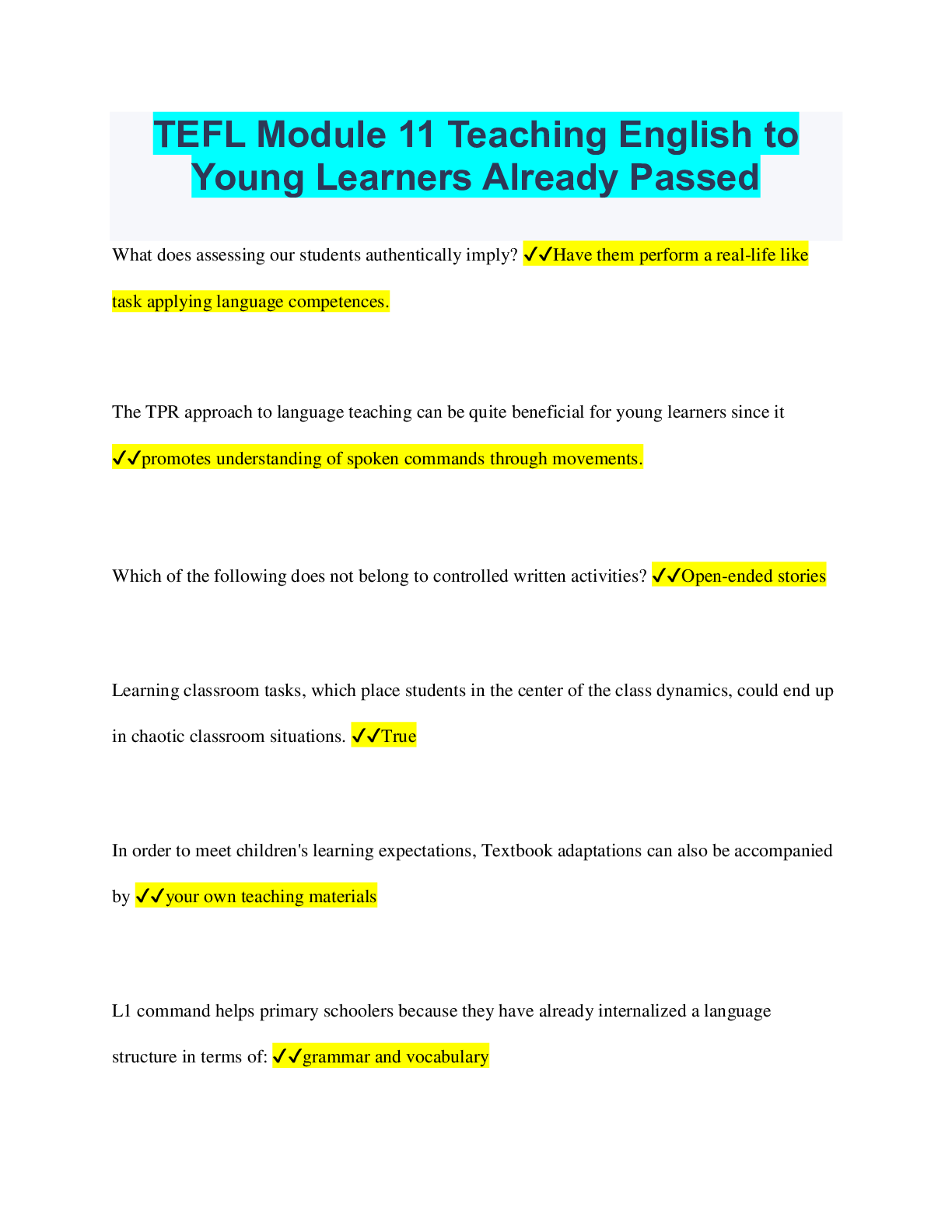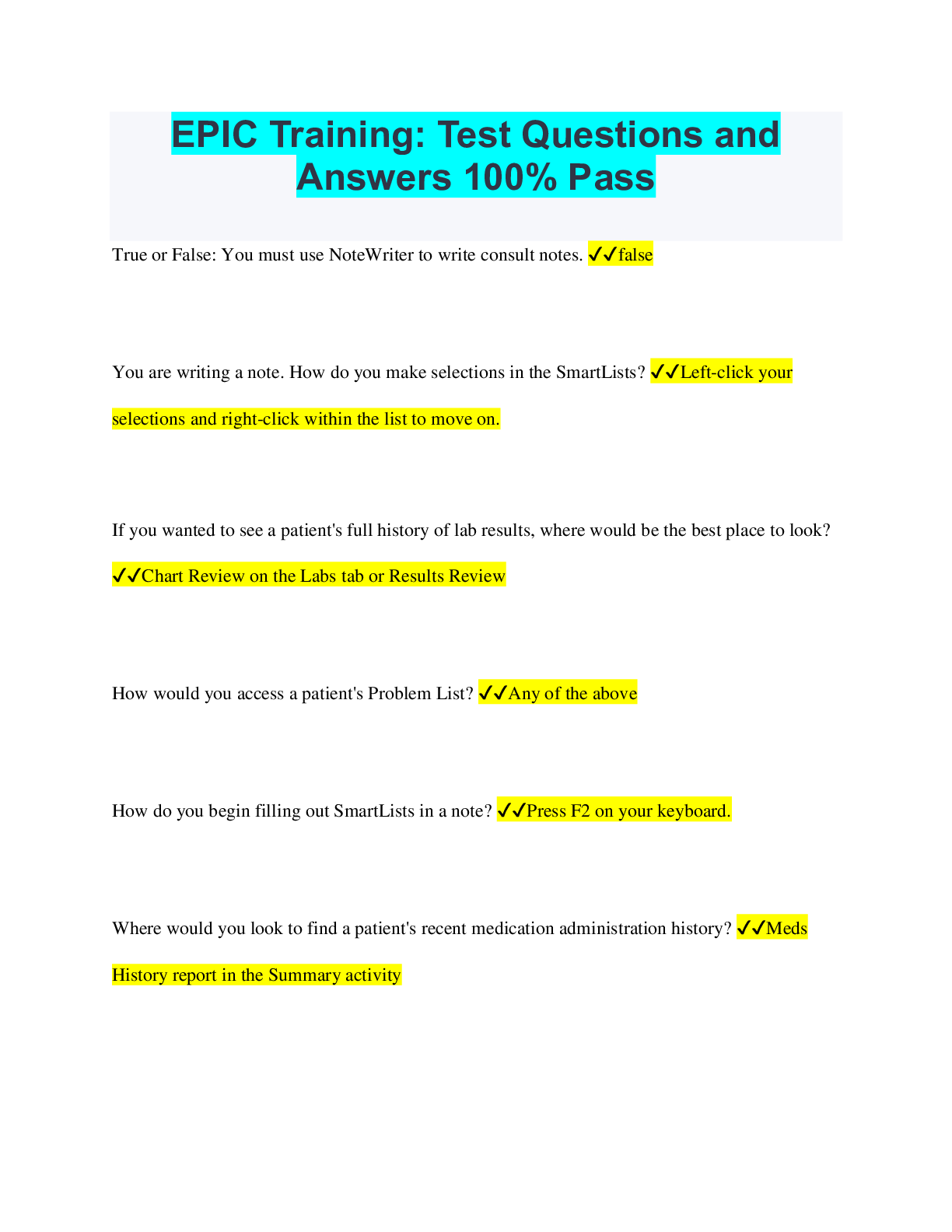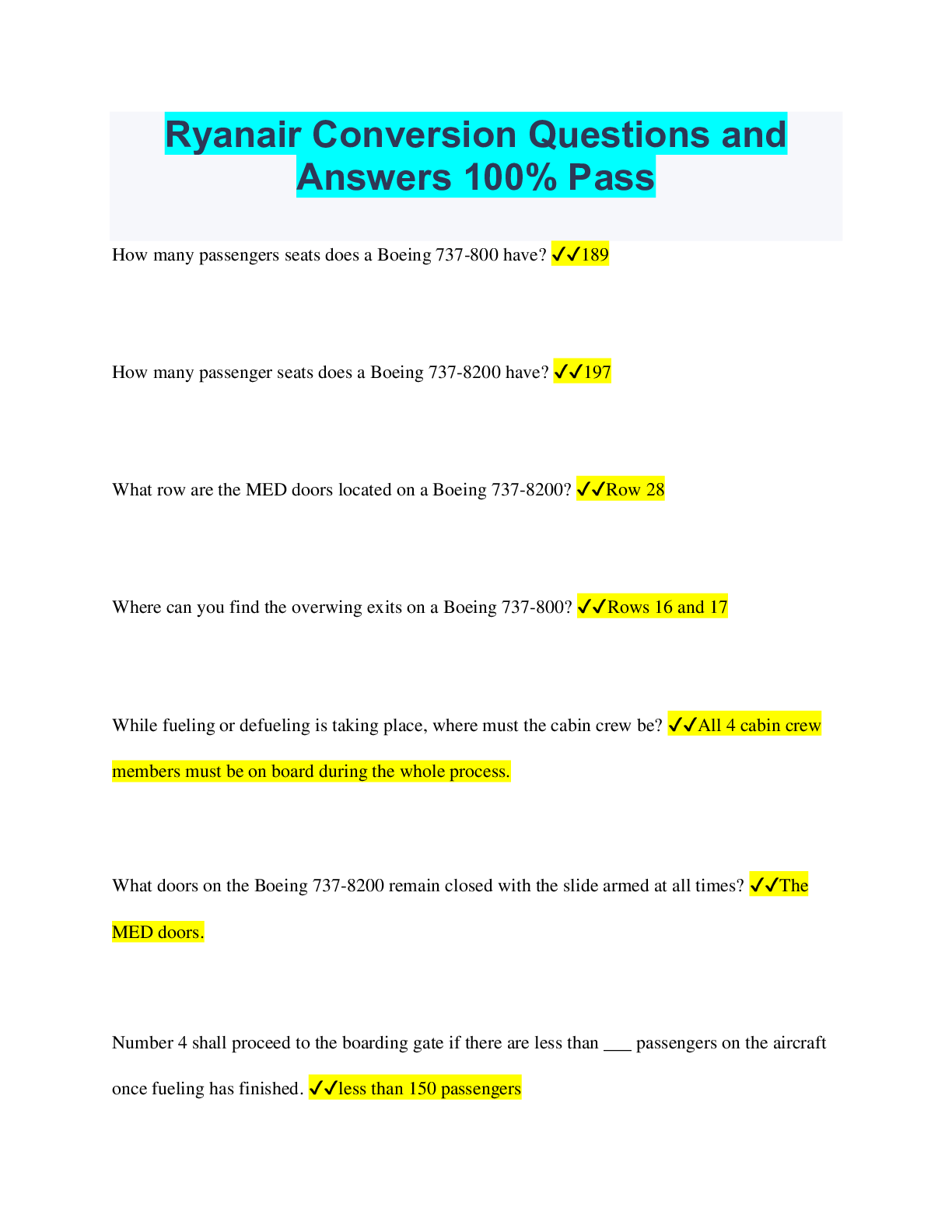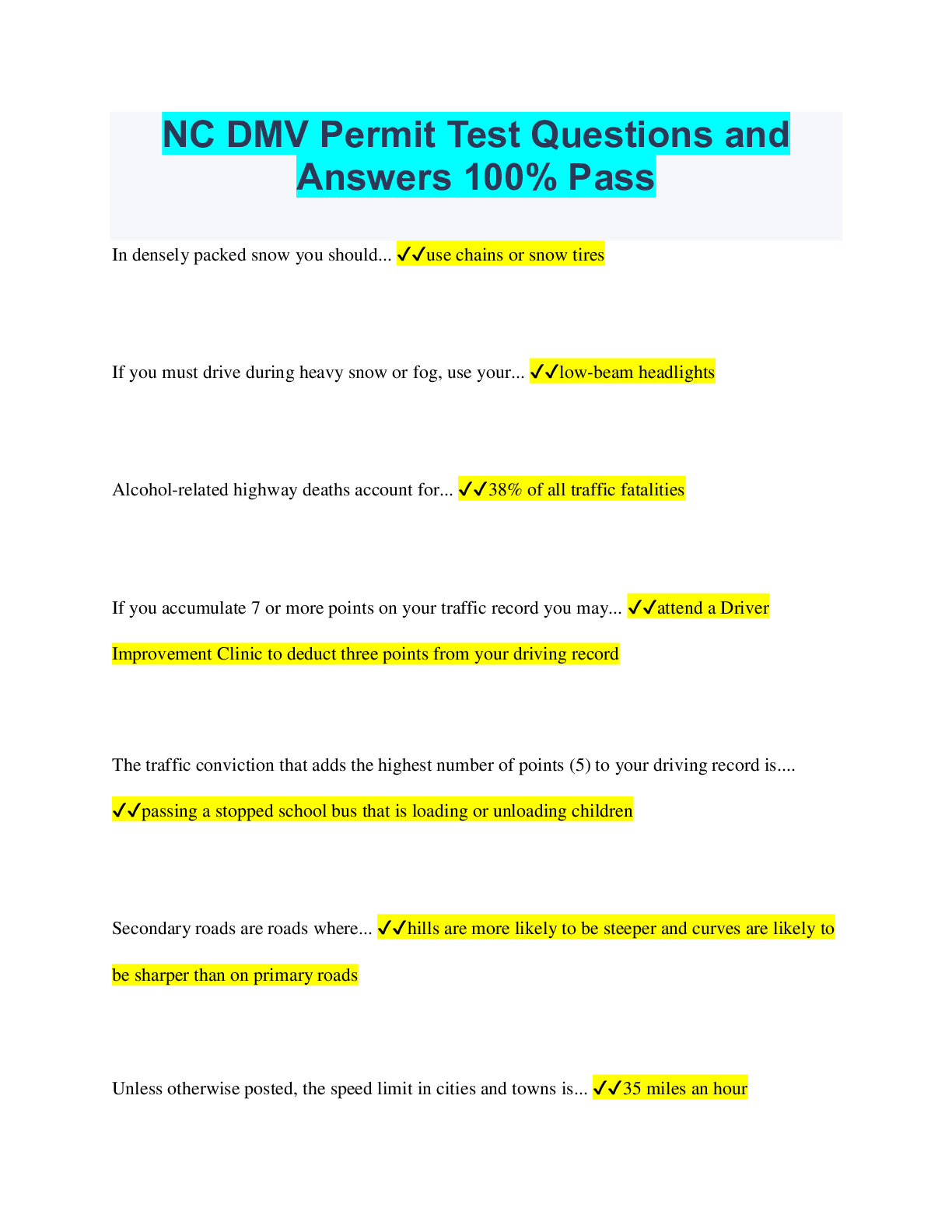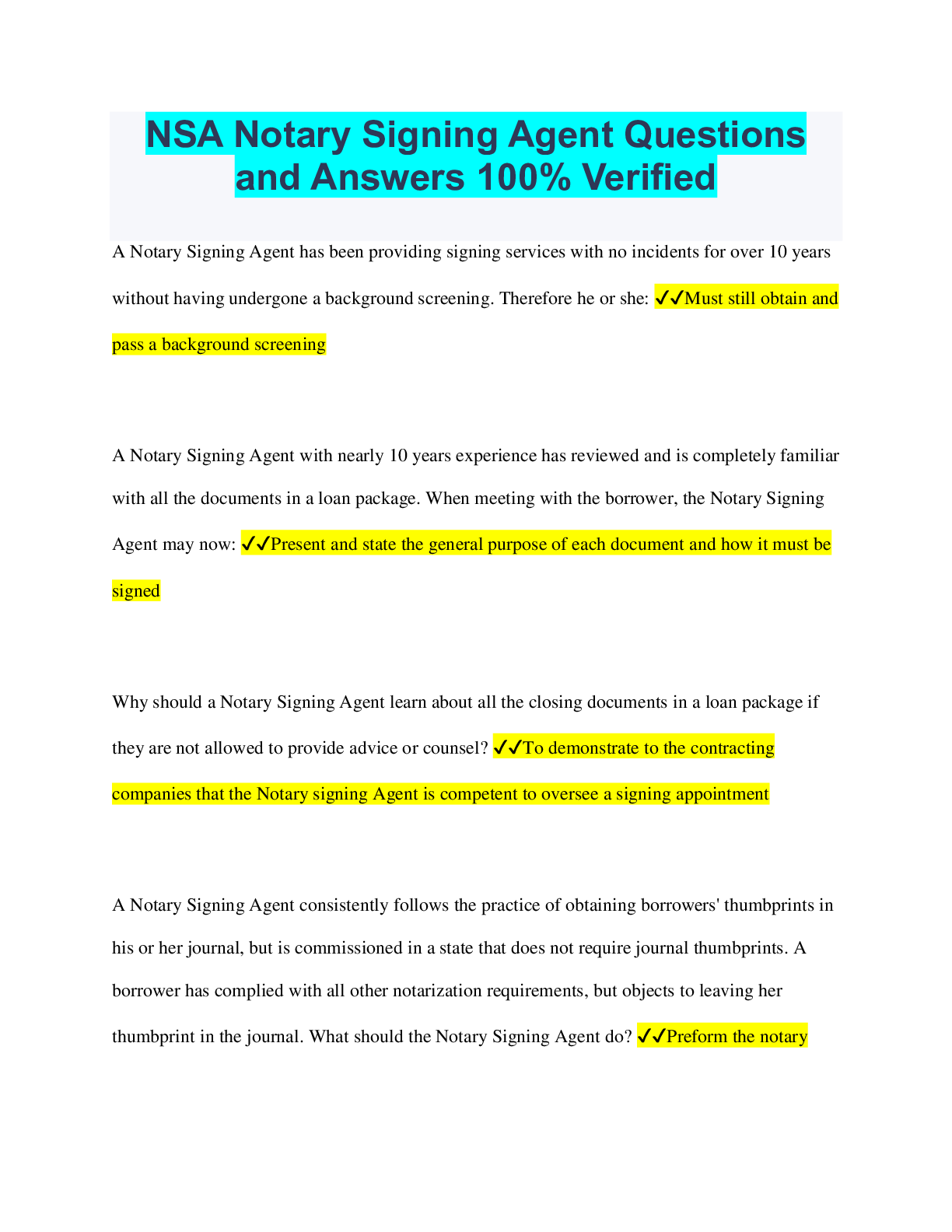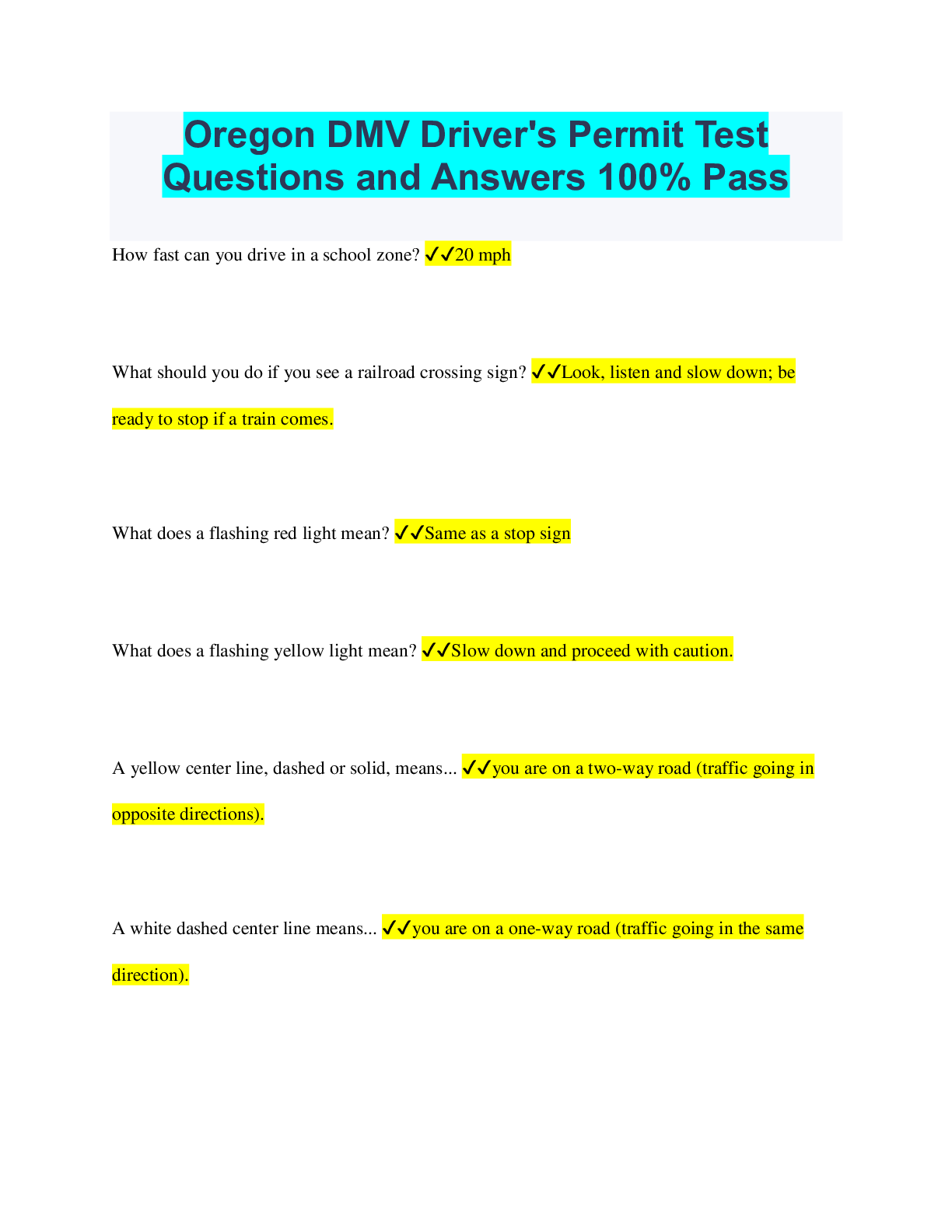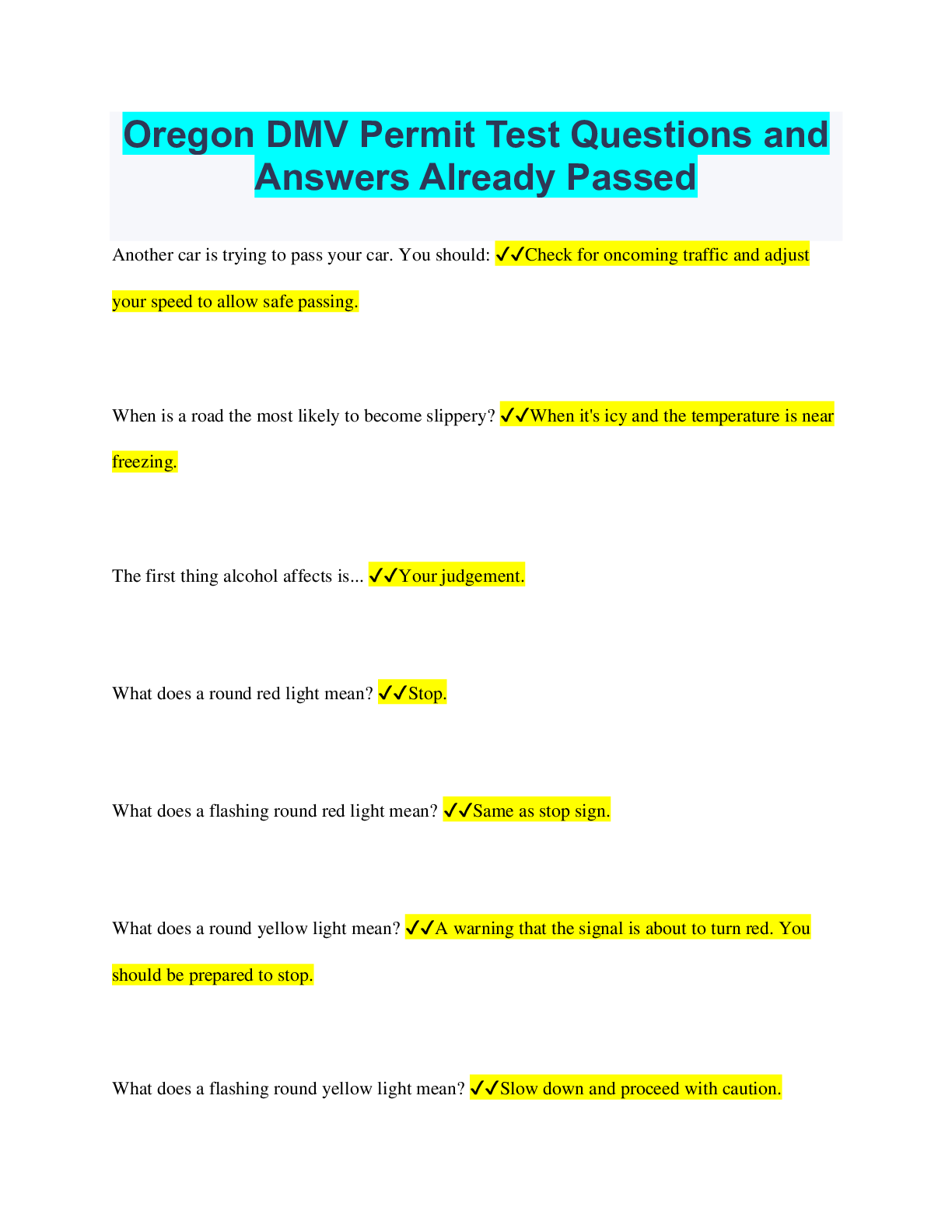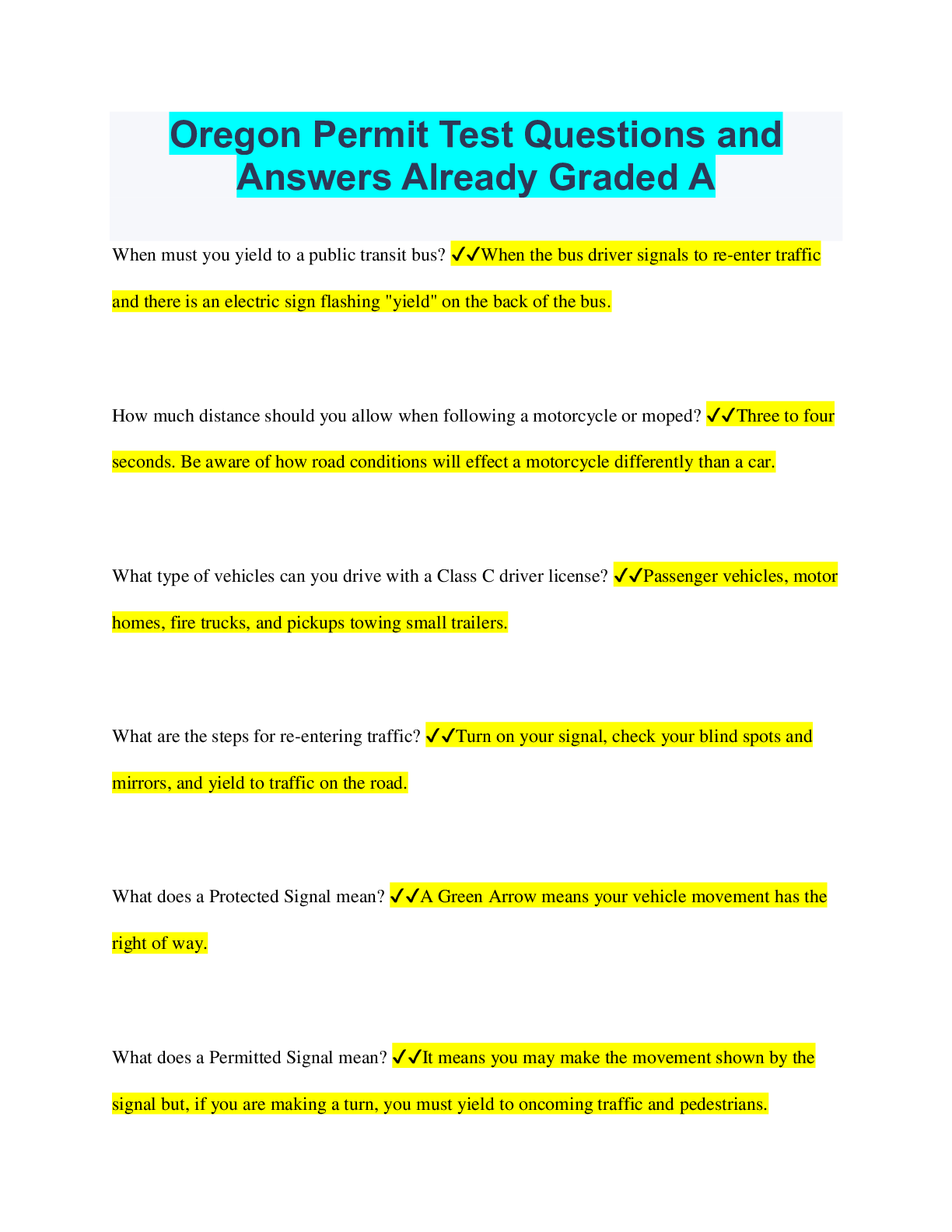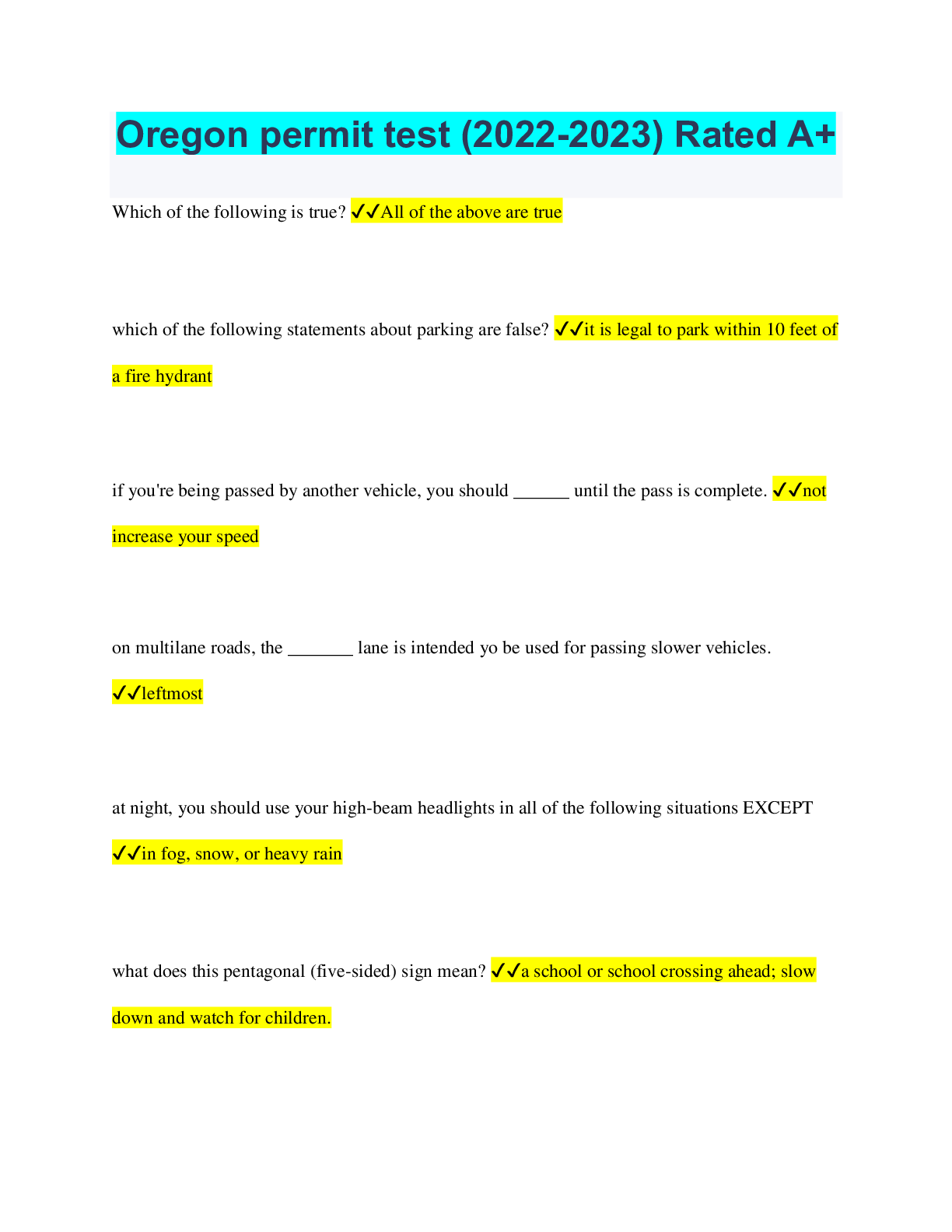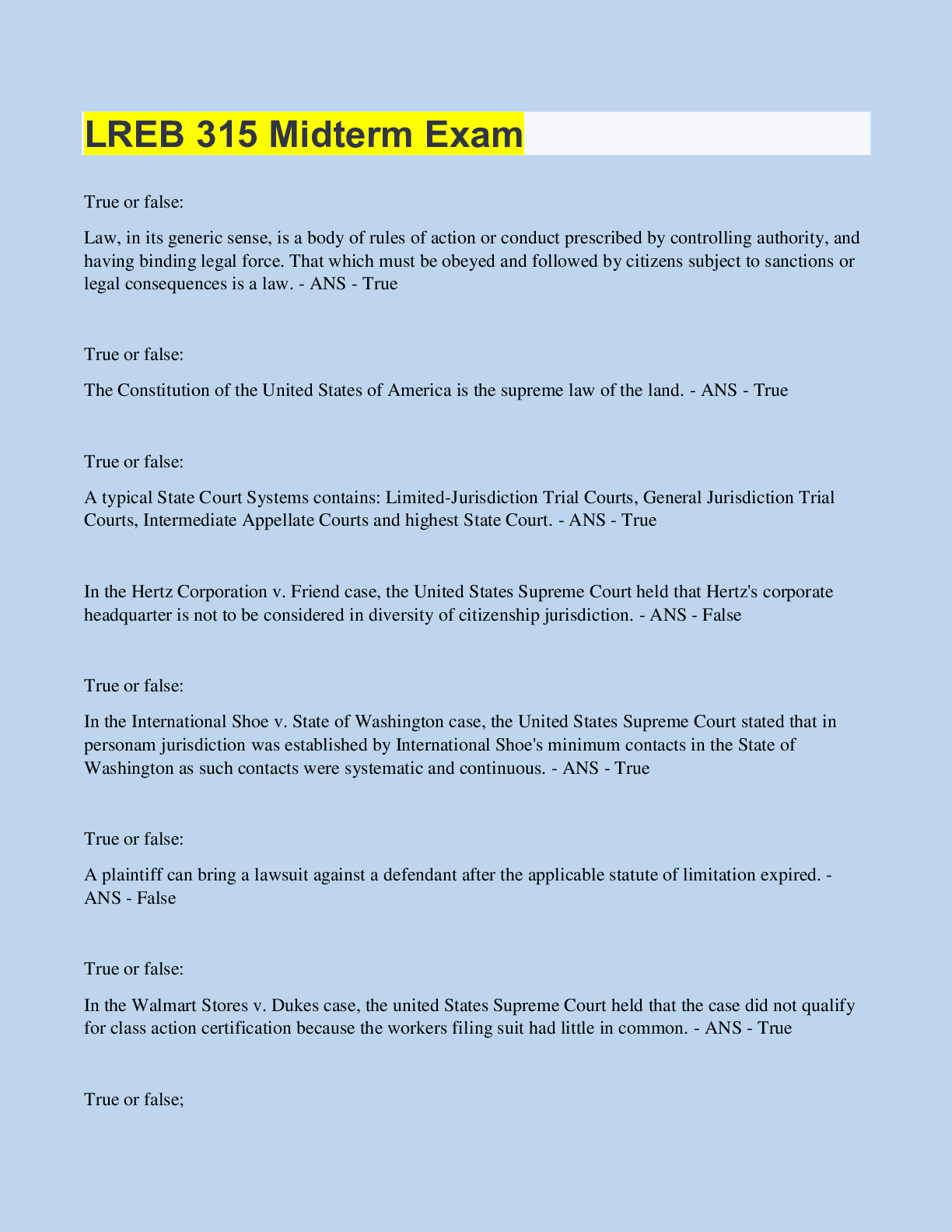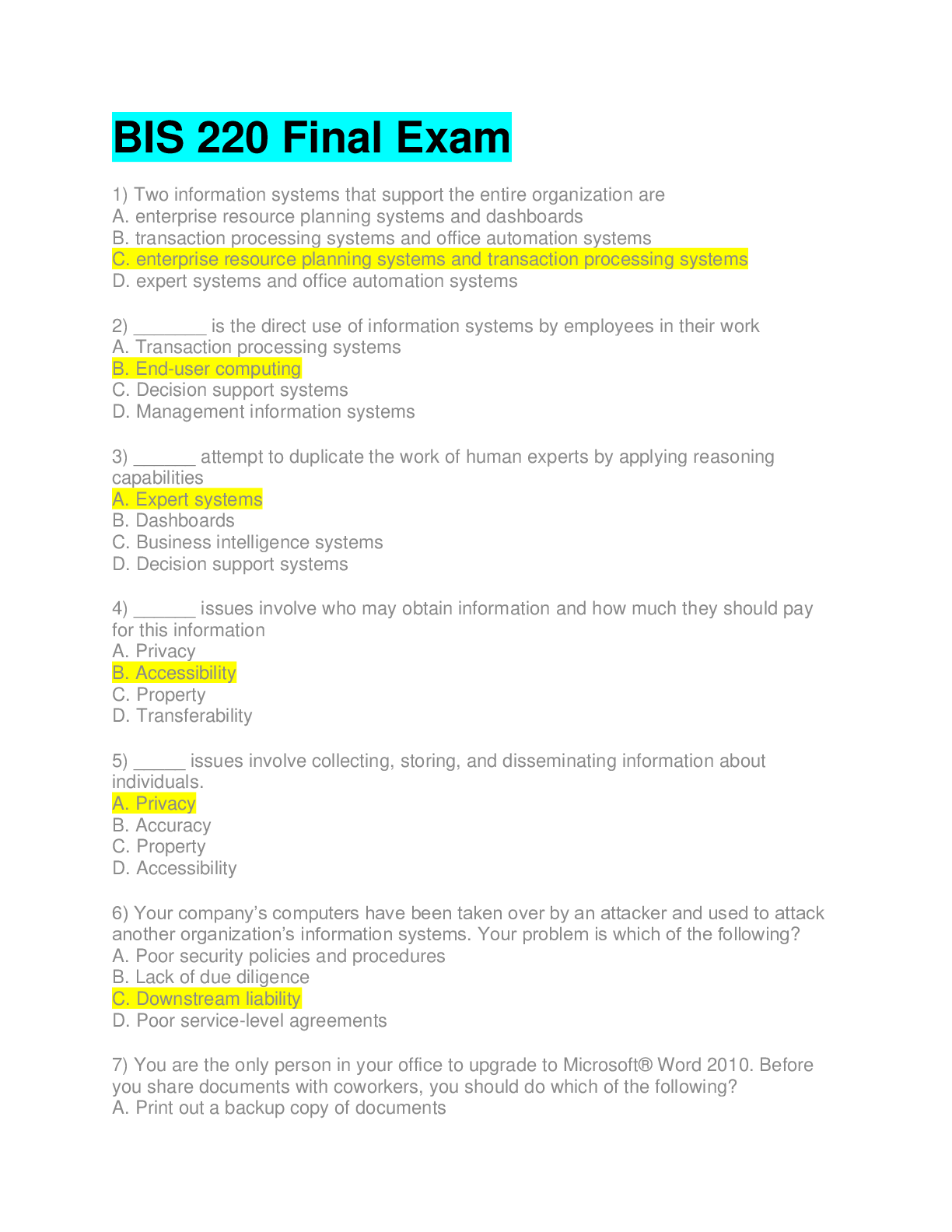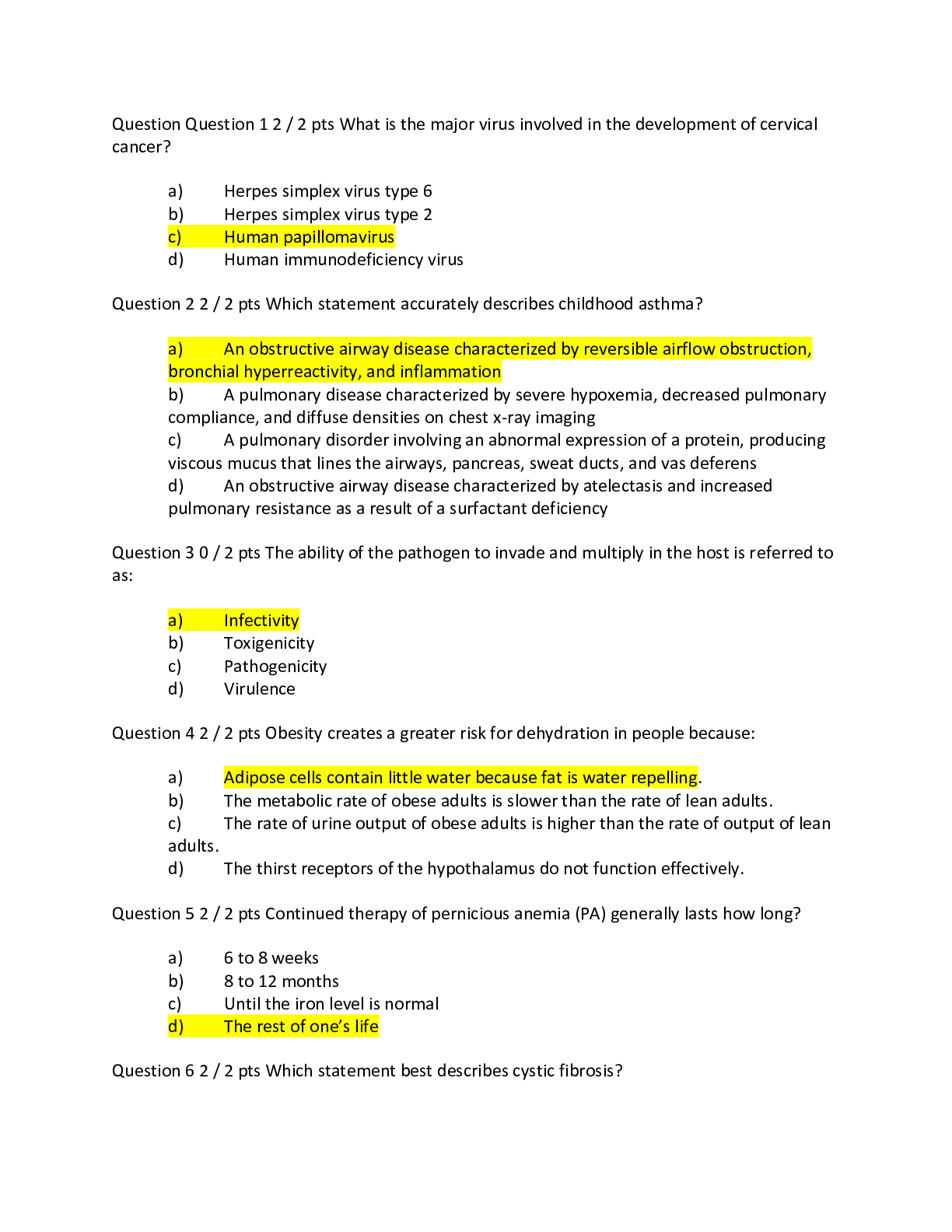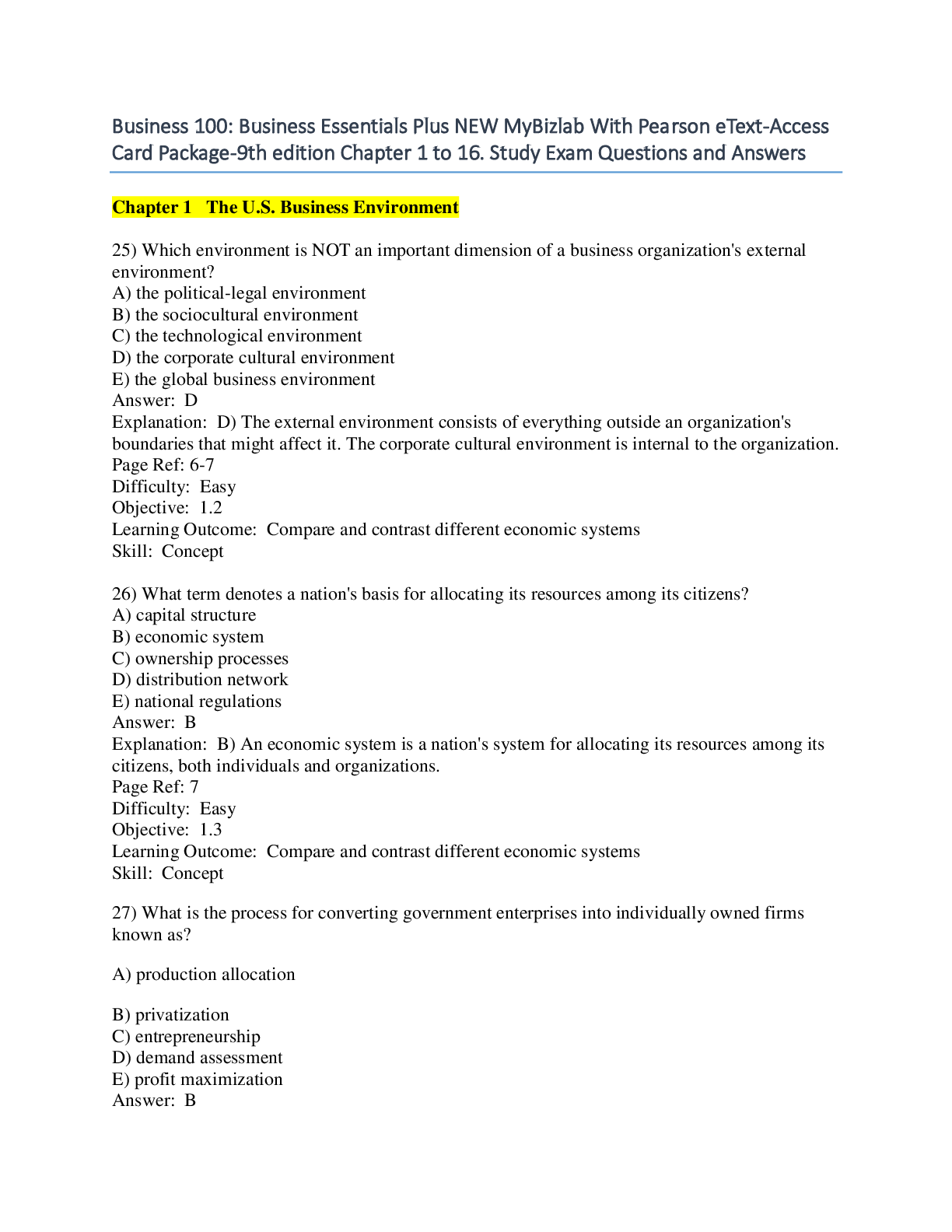Business Administration > QUESTIONS & ANSWERS > MGT 330 Exam Questions and Answers Graded A+ (All)
MGT 330 Exam Questions and Answers Graded A+
Document Content and Description Below
1. The best managers prioritize efficiency over effectiveness. FALSE The best managers maintain a clear focus on both effectiveness and efficiency. AACSB: Analytical Thinking Accessibility: Keybo... ard Navigation Blooms: Understand Difficulty: 2 Medium Learning Objective: 01-01 Describe the four functions of management. Topic: Functional Level Strategy 2. The four fundamental management principles include analyzing current situation, determining objectives, choosing corporate and business strategies, and determining the resources needed to achieve the organization’s goals. FALSE The fundamental management principles include planning, organizing, leading, and controlling. AACSB: Analytical Thinking AACSB: Knowledge Application Accessibility: Keyboard Navigation Blooms: Remember Difficulty: 1 Easy Learning Objective: 01-01 Describe the four functions of management. Topic: Functional Level Strategy 3. Top-level managers are also called tactical managers since they must translate the general goals into specific objectives and activities. FALSE Top-level managers, often referred to as strategic managers, are supposed to focus on long-term issues and emphasize the survival, growth, and overall effectiveness of an organization. AACSB: Analytical Thinking AACSB: Knowledge Application Accessibility: Keyboard Navigation Blooms: Understand Difficulty: 2 Medium Learning Objective: 01-02 Understand what managers at different organizational levels do. Topic: Functional Structure 4. A team leader’s job is less challenging than frontline and other types of managers’ jobs because team leaders always have direct control over team members. FALSE In some ways, a team leader's job can be more challenging than frontline and other types of managers' jobs because team leaders often lack direct control (e.g., hiring and firing) over team members. Without this direct control, team leaders need to be creative in how they inspire, motivate, and guide their teams to achieve success. AACSB: Analytical Thinking Accessibility: Keyboard Navigation Blooms: Understand Difficulty: 2 Medium Learning Objective: 01-02 Understand what managers at different organizational levels do. Topic: Functional Structure 5. As managers rise through an organization, they will probably rely less on their technical skills. TRUE Technical skills are most important early in one's career. Conceptual and decision skills become more important than technical skills as one rises higher in the company. AACSB: Analytical Thinking Accessibility: Keyboard Navigation Blooms: Understand Difficulty: 2 Medium Learning Objective: 01-03 Define the skills needed to be an effective manager. Topic: Managerial Skills 6. Lower-level managers who possess technical skills tend to earn less credibility from their subordinates than comparable managers without technical know-how. FALSE Lower-level managers who possess technical skills earn more credibility from their subordinates than comparable managers without technical know-how. Thus, newer employees may want to become proficient in their technical area (e.g., human resources management or marketing) before accepting a position as team leader or frontline manager. AACSB: Analytical Thinking Accessibility: Keyboard Navigation Blooms: Understand Difficulty: 2 Medium Learning Objective: 01-03 Define the skills needed to be an effective manager. Topic: Managerial Skills 6. The five key elements that make the current business environment different from those of the past include globalization, technological change, the importance of knowledge and ideas, collaboration across organizational boundaries, and an increasingly diverse labor force. TRUE Management is a challenge requiring constant adaptation to new circumstances. The five key elements that make the current business landscape different from those of the past are: globalization, technological change, the importance of knowledge and ideas, and collaboration across organizational boundaries, and an increasingly diverse labor force. AACSB: Analytical Thinking AACSB: Knowledge Application Accessibility: Keyboard Navigation Blooms: Remember Difficulty: 1 Easy Learning Objective: 01-04 Summarize the major challenges facing managers today. Topic: Adaptive Change Topic: Collaboration 7. Social capital is the goodwill stemming from your social relationships. TRUE Social capital is the goodwill stemming from your social relationships. AACSB: Analytical Thinking AACSB: Knowledge Application Accessibility: Keyboard Navigation Blooms: Remember Difficulty: 1 Easy Learning Objective: 01-04 Summarize the major challenges facing managers today. Topic: Collaboration 8. The most important innovation is always the product itself and not the way it is delivered. FALSE Sometimes the most important innovation isn't the product itself but the way it is delivered. AACSB: Analytical Thinking Accessibility: Keyboard Navigation Blooms: Understand Difficulty: 2 Medium Learning Objective: 01-05 Recognize how successful managers achieve competitive advantage. Topic: Competitive Environment 9. The fundamental success drivers for an organization are product delivery time and risk aversion. FALSE To succeed, managers must deliver the fundamental success drivers: innovation, quality, service, speed, and cost competitiveness. AACSB: Analytical Thinking AACSB: Knowledge Application Accessibility: Keyboard Navigation Blooms: Remember Difficulty: 1 Easy Learning Objective: 01-05 Recognize how successful managers achieve competitive advantage. Topic: Competitive Environment 10. Which of the following best describes management? A. the method of executing, responding, and delivering results in a fast and timely manner B. the process of working with people and resources to accomplish organizational goals C. the technique of keeping costs low enough so the company can realize profits and price its products at levels that are attractive to consumers D. the introduction of new goods and services E. the method of creating goodwill through social relationships Management is the process of working with people and resources to accomplish organizational goals. AACSB: Analytical Thinking Accessibility: Keyboard Navigation Blooms: Remember Difficulty: 1 Easy Learning Objective: 01-01 Describe the four functions of management. Topic: Functional Level Strategy 11. Planning involves which of the following? A. analyzing current situations B. monitoring performance C. attracting people to the organization D. motivating employees E. implementing necessary changes Planning activities include analyzing current situations, anticipating the future, determining objectives, deciding on what types of activities the company will engage, choosing corporate and business strategies, and determining the resources needed to achieve an organization's goals. AACSB: Analytical Thinking AACSB: Knowledge Application Accessibility: Keyboard Navigation Blooms: Understand Difficulty: 2 Medium Learning Objective: 01-01 Describe the four functions of management. Topic: Functional Level Strategy 12. _____ is specifying the goals to be achieved and deciding in advance the appropriate actions needed to achieve those goals. A. Staffing B. Leading C. Organizing D. Planning E. Controlling Planning is specifying the goals to be achieved and deciding in advance the appropriate actions needed to achieve those goals. AACSB: Analytical Thinking AACSB: Knowledge Application Accessibility: Keyboard Navigation Blooms: Remember Difficulty: 1 Easy Learning Objective: 01-01 Describe the four functions of management. Topic: Functional Level Strategy 13. Synthesis Inc. periodically reviews the goals of the company. During the process, the managers of the company analyze their current strategies as compared to their competitors’ strategies, determine goals that they will pursue, and decide upon specific actions for each area of the company to take in pursuit of these goals. With these actions, the managers are engaged in the management function of A. organizing. B. planning. C. goal coordination. D. controlling. E. leading. Planning is specifying the goals to be achieved and deciding in advance the appropriate actions needed to achieve those goals. Planning activities include analyzing current situations, anticipating the future, determining objectives, deciding on what types of activities the company will engage, choosing corporate and business strategies, and determining the resources needed to achieve the organization's goals. In this case, the managers of Synthesis Inc. are engaged in planning as they analyze their current strategies as compared to their competitors' strategies, determine goals that they will pursue, and decide upon specific actions for each area of the company to take in pursuit of these goals. AACSB: Reflective Thinking Accessibility: Keyboard Navigation Blooms: Apply Difficulty: 3 Hard Learning Objective: 01-01 Describe the four functions of management. Topic: Functional Level Strategy 14. Archer Inc. recently embarked on an effort to increase coordination and cooperation within the company. During the process, the managers of the organization reviewed and specified job responsibilities, grouped jobs into work units, and reallocated resources within the company. The managers were exercising the management function of A. planning. B. organizing. C. leading. D. controlling. E. budgeting. [Show More]
Last updated: 2 years ago
Preview 1 out of 310 pages
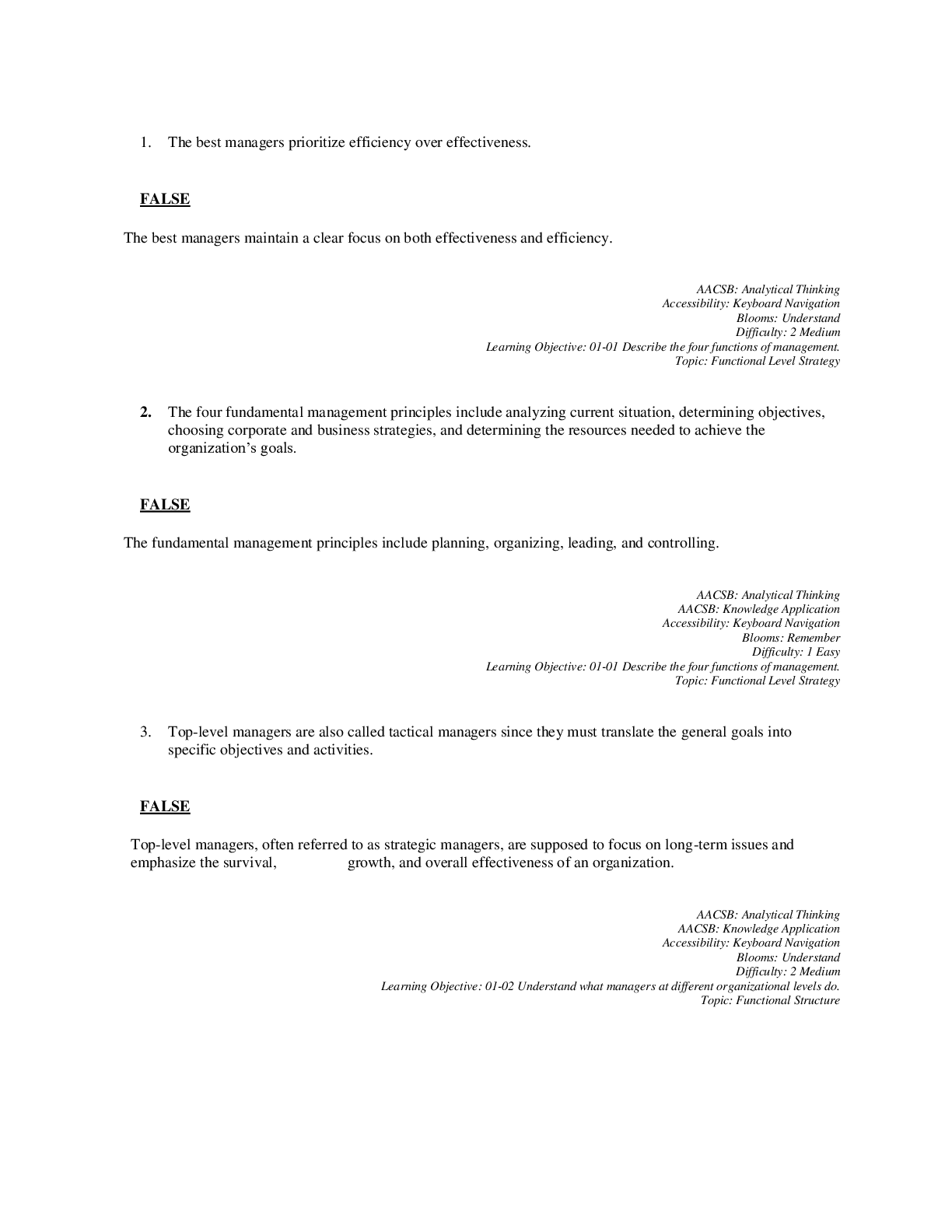
Buy this document to get the full access instantly
Instant Download Access after purchase
Buy NowInstant download
We Accept:

Reviews( 0 )
$14.00
Can't find what you want? Try our AI powered Search
Document information
Connected school, study & course
About the document
Uploaded On
Aug 10, 2021
Number of pages
310
Written in
Additional information
This document has been written for:
Uploaded
Aug 10, 2021
Downloads
0
Views
94

.png)

